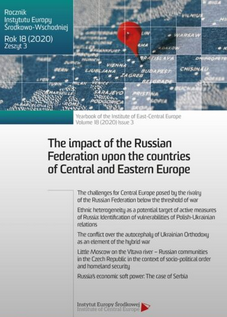Russia’s economic soft power: The case of Serbia
Russia’s economic soft power: The case of Serbia
Author(s): Sandra BaniakSubject(s): National Economy, Economic history, Economic policy, Government/Political systems, International relations/trade, Political behavior, Transformation Period (1990 - 2010), Present Times (2010 - today)
Published by: Instytut Europy Środkowej
Keywords: Russia; Serbia; Central and Eastern Europe; economic diplomacy; economic influence; soft power;
Summary/Abstract: Serbia inherited Yugoslavia’s tendency to pursue its foreign policy in terms of “multi-vector” policy and balancing between the West and the East to achieve its own political goals and maintain the attention of other countries. Despite the desire to join the European Union, as officially declared by the state authorities, Serbia also strives to maintain a “strategic partnership” with Russia. This paper presents Russia’s interests in the policy towards Serbia in the economic sphere over the years, starting from 1999. It points to the complexity of Serbian-Russian economic relations and their relationship with political issues. Russia, as a permanent member of the UN Security Council, can significantly affect Serbia’s internal and foreign policy, making it dependent on guarding Serbia’s sovereignty and territorial integrity and through the lack of recognition of Kosovo’s independence by pursuing its own interests, manifested by an increasing Russian presence in the energy sector.
Journal: Rocznik Instytutu Europy Środkowo-Wschodniej
- Issue Year: 18/2020
- Issue No: 3
- Page Range: 93-114
- Page Count: 22
- Language: English

